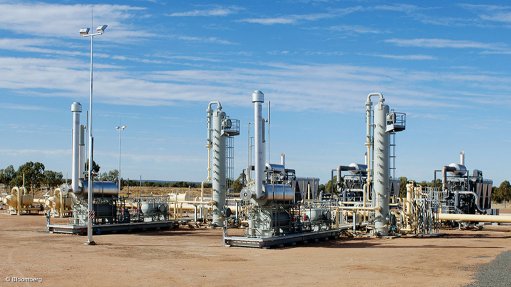
Photo by: Bloomberg
PERTH (miningweekly.com) – The Northern Territory government will lift a near two-year moratorium on fracking, accepting all 135 recommendations made by a recent independent inquiry.
Chief Minister Michael Gunner said on Tuesday that the implementation of the recommendations in the inquiry report would begin, noting that the inquiry had found that the risk from fracking could be reduced to an acceptable level if allowed in “highly regulated circumstances in tightly prescribed areas”.
About 49% of the territory would be frack free, including in National Parks, Conservation Areas, Indigenous Protected Areas, towns, residential and strategic assets, and areas of high cultural, environmental or tourism value. In the remainder of the territory, strict new laws and regulations would be put in place, he stated.
“We understand that many territorians are concerned about increased greenhouse gas emissions from fracking and as recommended by the inquiry, I have written to the Prime Minister and the Federal Leader of the Opposition seeking their agreement to partner with us in offsetting all additional emissions,” Gunner said.
“In addition, this government will soon be seeking comment on draft Climate Change and Environmental Offset policies, which we want to finalise before the end of the 2018.”
Gunner said that the reforms would require significant additional resources, announcing that the Northern Territory government had approved A$5.33-million over three years to implement the 135 recommendations.
Industry would also be required to pay its fair share through an appropriate cost recovery model, the Chief Minister noted.
QUICK RAMP-UP
The Australian Petroleum Production and Exploration Association (Appea) has welcomed the government’s announcement, but warned that the manner and timeframe in which the recommendations were implemented would be critical in determining the commercial viability of the gas industry in the Northern Territory.
“If they are to be implemented, they must be addressed within the next six months to ensure the industry can be on the ground exploring in the 2019 dry season,” Appea Northern Territory director Matthew Doman said.
“Businesses, contractors and workers in the territory are counting on the quick ramp-up of the gas industry to get the territory moving again. Explorers are ready to resume their activities as soon as the government gives the green light.”
Australian oil and gas major Santos also welcomed the development, with CEO and MD Kevin Gallagher saying it was a “great” outcome for territory communities.
“Territory businesses, contractors and workers are counting on the quick ramp-up of the onshore gas industry to get the territory moving again," Gallagher said.
“As soon as we can get back to work, we will employ local people, engage local companies and resume royalty payments to host traditional owners.
“Santos does not want to let them down and we will be ready to go in the 2019 dry season.”
Gallagher said that with exploration and appraisal success, the Northern Territory’s McArthur basin had the potential to do for the Northern Territory and Australia what the shale gas revolution had done for America, providing the competitive advantage to breathe life back into energy-intensive industries and generate wealth for the nation.
“Opening up access to this clean energy resource in the territory is a great outcome for national energy security, potentially attracting new energy-intensive industries to Darwin and supporting new and expanded pipelines connecting to the east coast domestic gas market," Gallagher said.
“There is a window of opportunity to also grow liquefied natural gas exports as global supply gaps open up in the early to mid-2020s.
“Implementing the conditions for onshore gas exploration by the end of 2018 and getting the regulatory framework in place to allow onshore gas development by 2021 is vitally important to deliver a viable onshore gas industry, as well as the desperately-needed economic and social benefits territorians are counting on,” he added.
Gunner said that work on a detailed implementation plan for the 135 recommendations of the final report would begin immediately and be completed and released to the public in July this year.